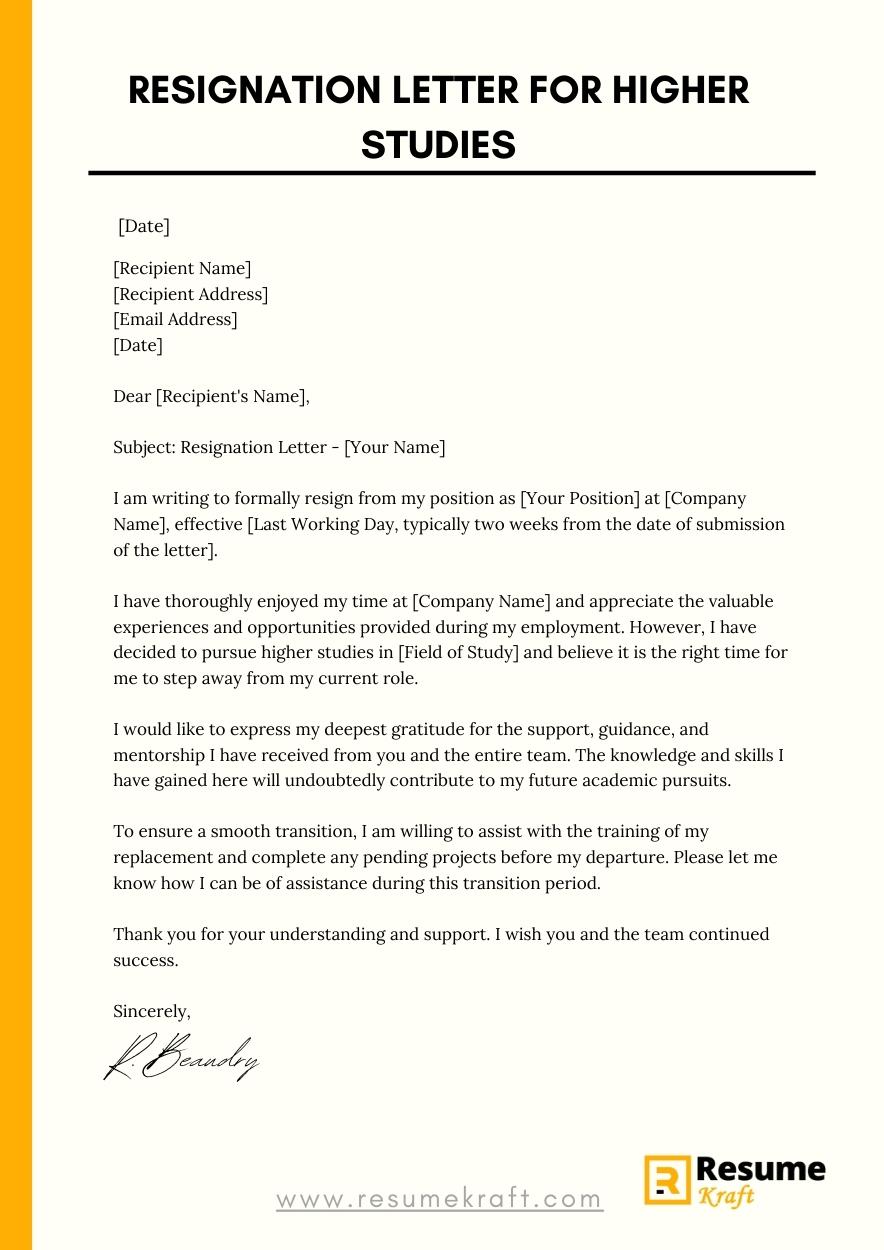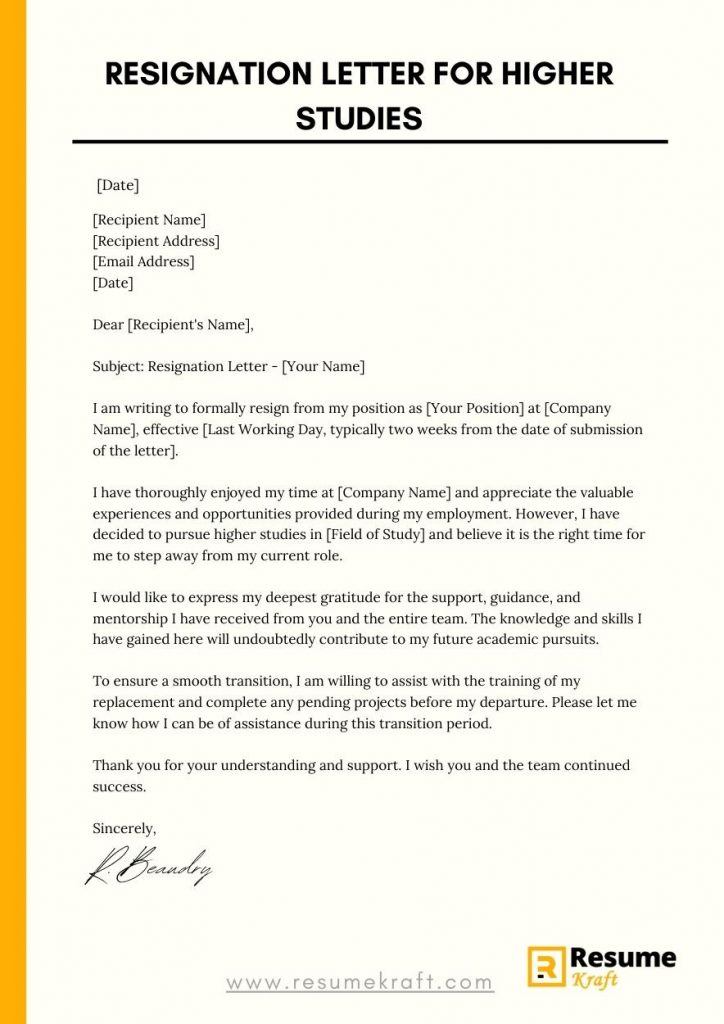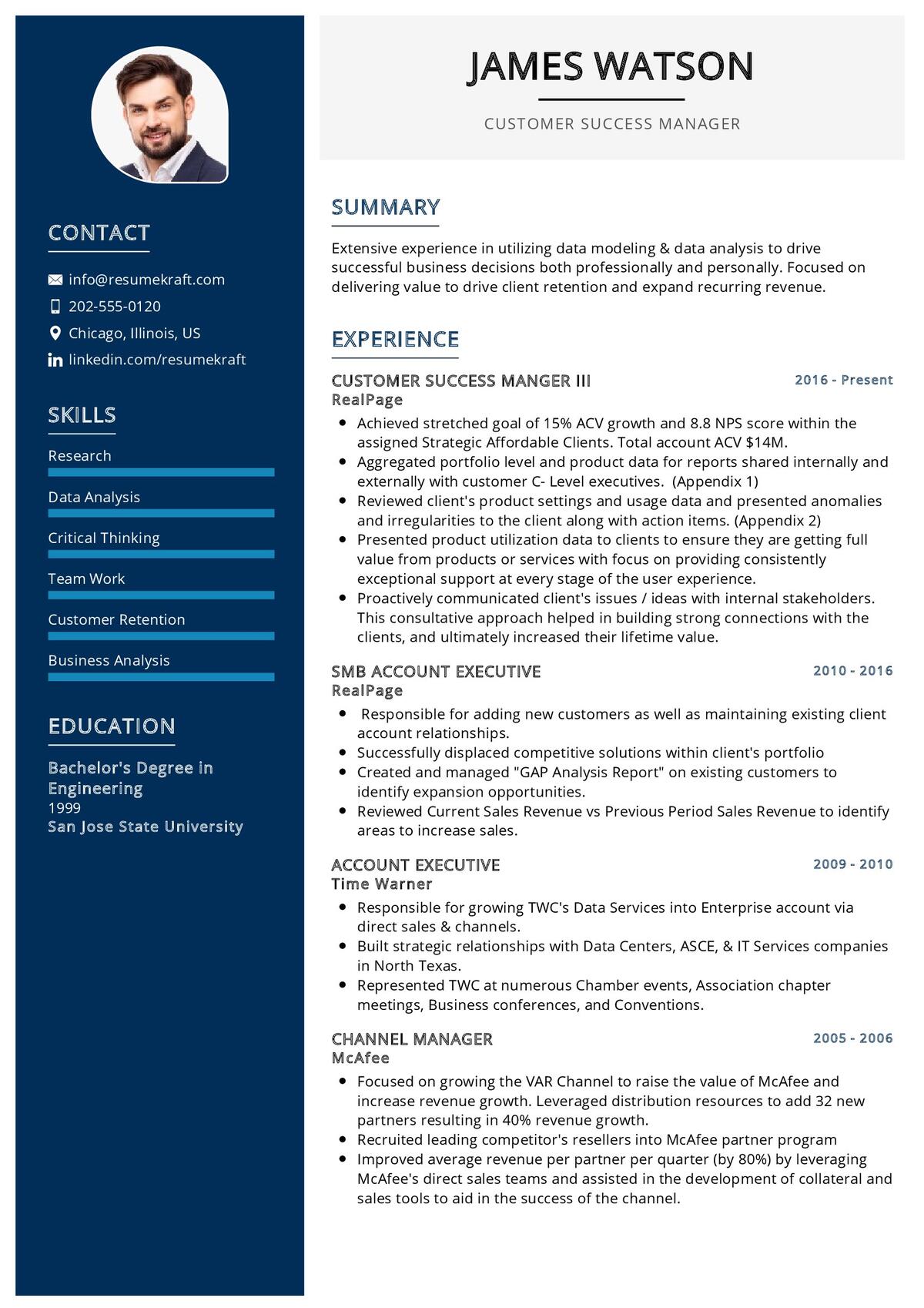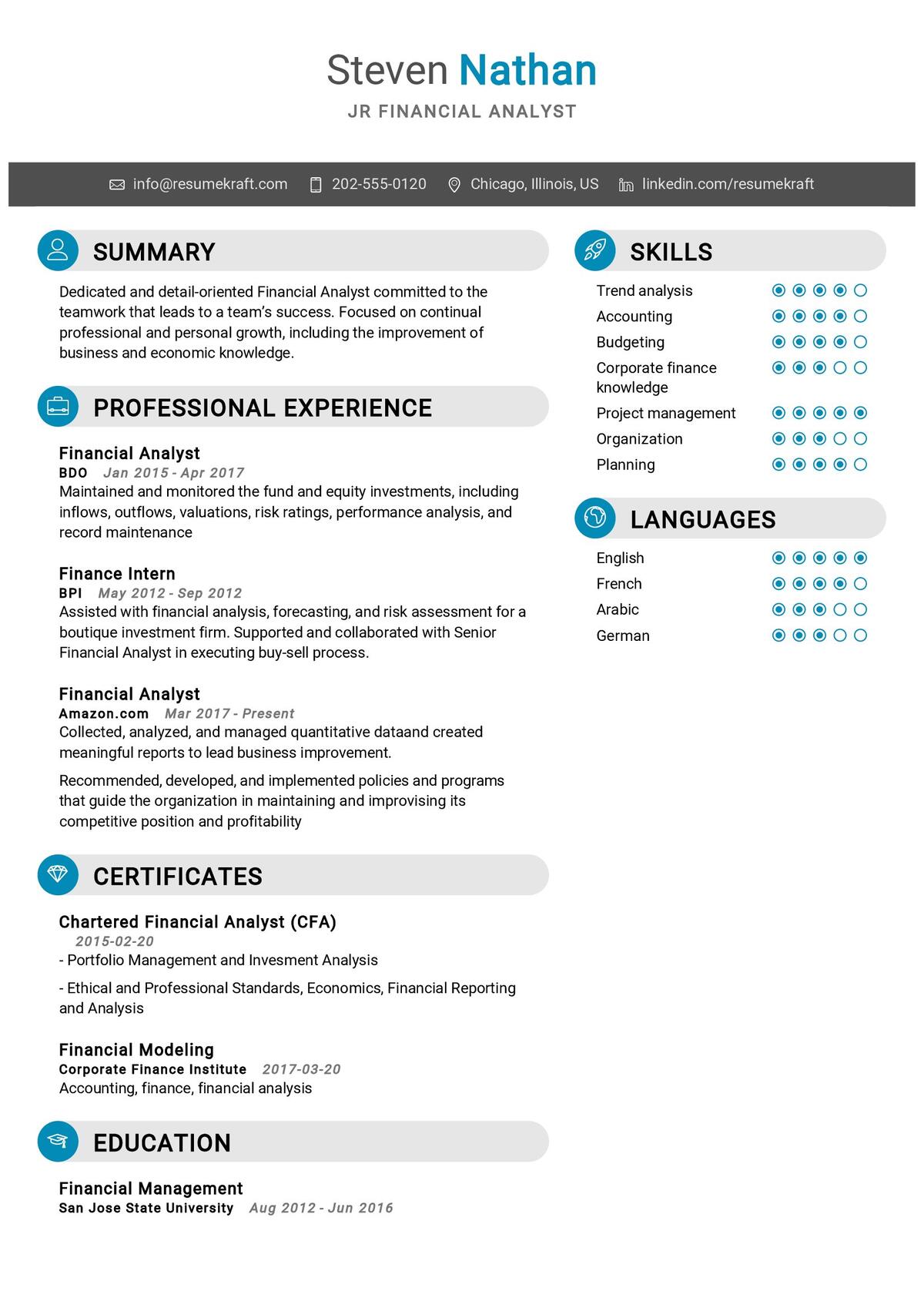
Are you considering pursuing higher studies and need to resign from your current job? Writing a resignation letter for higher studies is an essential step in maintaining professionalism and ensuring a smooth transition out of your current role. In this article, we will guide you on what to include, what not to include, and how to format your resignation letter. We will also provide you with real person resignation letter samples to help you create your own.
What to Include in Your Resignation Letter
When writing a resignation letter for higher studies, there are a few key elements you should include to ensure clarity and professionalism:
- Date: Start your letter by including the date when you intend to submit your resignation. This provides your employer with a clear timeline.
- Recipient’s Name and Job Title: Address your letter to your immediate supervisor or the appropriate person within your organization. Mention their name and job title to ensure it reaches the correct individual.
- Subject Line: Add a clear subject line to your letter, such as “Resignation Letter – [Your Name].” This helps the recipient to quickly identify the purpose of the letter.
- Greeting: Begin the letter with a professional salutation, such as “Dear [Recipient’s Name],” or “To Whom It May Concern.”
- Statement of Resignation: Clearly state that you are resigning from your position and provide the effective date of your resignation. It is recommended to offer at least two weeks’ notice, allowing sufficient time for your employer to find a replacement.
- Reason for Resignation: Briefly mention your reason for resigning, which in this case would be to pursue higher studies. However, keep it concise and professional without going into too much detail.
- Express Gratitude: Show appreciation for the opportunities and experiences gained during your employment. Thank your employer and express gratitude for their support during your time with the company.
- Offer Assistance with Transition: Offer to assist with the transition process, such as training a replacement or completing any pending projects before your departure.
- Closing & Signature: Close the letter with a professional closing, such as “Sincerely” or “Best Regards,” and sign your name.
What Not to Include in Your Resignation Letter
While it’s important to include certain elements in your resignation letter, there are a few things you should avoid including:
- Negative Remarks: Avoid expressing any negative comments or criticisms about your employer, colleagues, or the company itself. Maintain a positive and professional tone throughout your letter.
- Emotional Content: Keep the letter professional and avoid emotional outbursts or personal explanations for your decision to leave. Stick to the facts and your reason for pursuing higher studies.
- Unnecessary Detail: Keep your letter concise and to the point. Avoid providing unnecessary details or elaborating on your reasons for leaving, as it may not be relevant to the purpose of the letter.
- Contradictions or Confusion: Ensure that the content of your resignation letter aligns with any discussions or decisions made prior to submitting the letter. Avoid any contradictions that may create confusion.
How to Format a Resignation Letter for Higher Studies
To ensure your resignation letter is well-formatted and professional, follow these guidelines:
- Use a Professional Format: Use a standard business letter format, including your contact information, the recipient’s information, the date, and appropriate salutations and closings.
- Keep it Concise: Aim to keep your letter to one page. Be clear and concise in your communication, avoiding unnecessary details or lengthy explanations.
- Use Proper Language: Maintain a respectful and professional tone throughout the letter. Avoid using slang or informal language.
- Proofread Carefully: Double-check your letter for any grammatical or spelling errors. It’s important to present a polished and error-free document.
- Print and Sign: If delivering a physical copy, print the letter on high-quality paper and sign it by hand. If sending via email, consider using an electronic signature for a professional touch.
Sample Resignation Letter for Higher Studies

Printed Resignation Letter Sample
[Your Name]
[Your Address]
[City, State, ZIP Code]
[Email Address]
[Phone Number]
[Date]
[Recipient’s Name]
[Recipient’s Job Title]
[Company Name]
[Company Address]
[City, State, ZIP Code]
Dear [Recipient’s Name],
Subject: Resignation Letter – [Your Name]
I am writing to formally resign from my position as [Your Position] at [Company Name], effective [Last Working Day, typically two weeks from the date of submission of the letter].
I have thoroughly enjoyed my time at [Company Name] and appreciate the valuable experiences and opportunities provided during my employment. However, I have decided to pursue higher studies in [Field of Study] and believe it is the right time for me to step away from my current role.
I would like to express my deepest gratitude for the support, guidance, and mentorship I have received from you and the entire team. The knowledge and skills I have gained here will undoubtedly contribute to my future academic pursuits.
To ensure a smooth transition, I am willing to assist with the training of my replacement and complete any pending projects before my departure. Please let me know how I can be of assistance during this transition period.
Once again, I would like to extend my sincere appreciation for the opportunities provided to me during my tenure at [Company Name]. I am confident that the skills and experiences gained here will greatly contribute to my success in my future endeavors.
Thank you for your understanding and support. I wish you and the team continued success.
Sincerely,
[Your Name]
Email Resignation Letter Example
Subject: Resignation Letter – [Your Name]
Dear [Recipient’s Name],
I hope this email finds you well. I am writing to inform you of my decision to resign from my position as [Your Position] at [Company Name], effective [Last Working Day, typically two weeks from the date of submission of the letter].
I have thoroughly enjoyed my time at [Company Name] and am grateful for the valuable experiences and opportunities provided during my employment. After careful consideration, I have decided to pursue higher studies in [Field of Study].
I would like to take this opportunity to thank you for your support, guidance, and mentorship throughout my tenure at [Company Name]. The knowledge and skills I have gained here will undoubtedly contribute to my future academic pursuits.
I am committed to ensuring a smooth transition and am willing to assist with the training of my replacement and complete any pending projects before my departure. Please let me know how I can be of assistance during this transition period.
Once again, I extend my sincere appreciation for the opportunities provided to me during my time at [Company Name]. I am confident that the skills and experiences gained here will greatly contribute to my success in my future endeavors.
Thank you for your understanding and support. I wish you and the team continued success.
Best regards,
[Your Name]
Key Takeaways
Writing a resignation letter for higher studies requires clarity, professionalism, and gratitude. Here are the key takeaways to remember:
- Include important elements such as the date, recipient’s name and job title, subject line, and a clear statement of resignation.
- Express gratitude for the opportunities and experiences gained during your employment.
- Offer assistance with the transition process to ensure a smooth handover.
- Format your letter in a professional and concise manner, following standard business letter guidelines.
- Proofread your letter carefully to ensure it is error-free and polished.
With these guidelines and sample resignation letter templates, you can confidently compose your own resignation letter for higher studies.
Planning to Write a Resume?
Check our job winning resume samples


Frequently Asked Questions
1. Can I resign while pursuing higher studies part-time?
Yes, it is possible to resign from your current job while pursuing higher studies part-time. In your resignation letter, clearly state your intention to resign due to your decision to enroll in part-time higher studies.
2. Is it necessary to state my reason for resigning in the letter?
While it is not necessary to provide a detailed explanation for your decision to resign, it is recommended to mention that you are leaving to pursue higher studies. This helps your employer understand your reason for leaving and shows transparency.
3. Can I send my resignation letter via email?
Yes, you can send your resignation letter via email, especially if it is the preferred method of communication within your organization. Just ensure that the content of the email follows the same guidelines as a printed resignation letter and includes a professional subject line.
4. Should I include a negative feedback or criticism in my resignation letter?
No, it is not advisable to include any negative remarks, feedback, or criticisms in your resignation letter. Keep the tone of the letter positive, professional, and respectful.
5. How much notice should I give before my last working day?
It is generally recommended to offer at least two weeks’ notice before your last working day. However, depending on your contract or company policy, you may need to provide a longer notice period. Check your employment agreement or consult with your HR department for any specific requirements.
Conclusion
Writing a resignation letter for higher studies is an important step in transitioning out of your current job and maintaining professionalism. By following the guidelines provided in this article and using the sample resignation letter templates, you can confidently create your own resignation letter tailored to your specific situation. Remember to express gratitude, maintain a professional tone, and offer your assistance during the transition process. Good luck with your higher studies!

